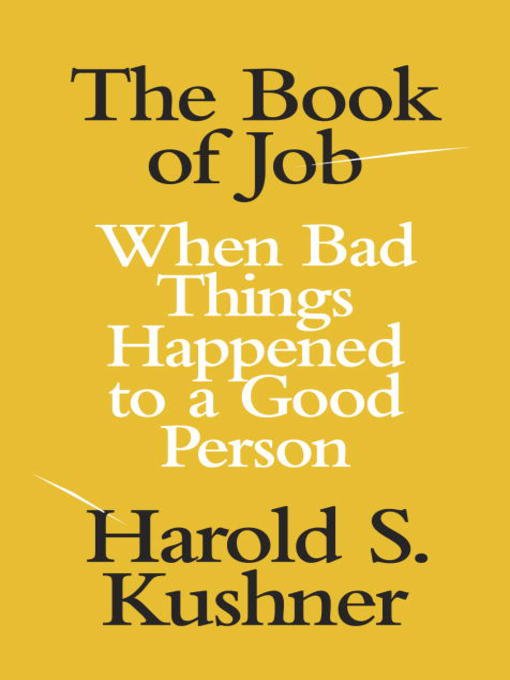
The Book of Job
When Bad Things Happened to a Good Person
کتاب های مرتبط
- اطلاعات
- نقد و بررسی
- دیدگاه کاربران
نقد و بررسی

August 27, 2012
When selecting an author for this 21st book in the Jewish Encounters series, editor Jonathan Rosen had a clear choice. In 1981, Kushner, a rabbi, published the best-selling book When Bad Things Happen to Good People after his 14-year-old son died of progeria. Kushner forthrightly tackled the problem of reconciling the simultaneous existence of evil and an all-powerful God. This is the issue confronted in the Book of Job, often cited as the most difficult book in the Bible. Job is a righteous man, happily married with 10 children and wealth. He is severely tested when he loses everything and his children all die. He endures this ordeal, not comforted by his friends who try to console him. Finally, after confrontation with God, he recognizes his mortality and the necessity of trusting God. Kushner skillfully analyzes this complex story, surveying many sources along with offering his own impressive interpretation. Although he does not resolve the thorny dilemma of why blameless people suffer, he advances our understanding of this quandary.

September 1, 2012
"There was a man in the land of Uz, whose name was Job." So begins one of the most vexing portions of the Hebrew Bible. Rabbi Kushner (Conquering Fear, 2009, etc.), who first considered the enigmatic text in the bestselling When Bad Things Happen to Good People (1981), revisits the powerful story. Chapter by chapter, with homilies, asides, jokes and bits of his personal history, the author considers the familiar story of the good man, bereft of all that he values because of Satan's challenge to God. In reviewing the three cycles of the poem in which friends fail to console or comfort Job, great theological debates proliferate. How should an innocent victim conduct himself? Is there really divine punishment and reward? Is there justice in Godly governance? As the dispute with the Almighty escalates, meaning becomes less certain, more inscrutable. Even the identity of a speaker becomes uncertain. Some difficulties with the Book of Job stem simply from its distance from our time, the subject matter or the language. Many words are unique. (Feminists will note that Kushner consistently refers to the Creator with masculine pronouns). The author marshals brief commentary from such authorities as Maimonides, Spinoza, Heschel and MacLeish. Perhaps Kushner, a generation after his most famous book, follows mainstream rabbinic theosophy more than he once did. He offers the belief that, fixed by the Creator, there is free will for humanity; nature, too, follows its own laws fixed by God. Thus, there exists the possibility of change and goodness--and maybe that's why bad things happen. A current, accessible examination of a difficult and wondrous jewel of world literature.
COPYRIGHT(2012) Kirkus Reviews, ALL RIGHTS RESERVED.

September 15, 2012
The author of When Bad Things Happen to Good People (1981) is a natural to cover the quintessential story of suffering for the excellent Jewish Encounters series. He expounds the text, explains what philology has determined about its structure and linguistic meanings, and offers the best and most influential things said about it. The Book of Job consists of the originally non-Jewish legend of Job (only one name in the whole book is Jewish); the Hebrew poem of Job, encompassing Job's colloquies with three would-be-comforting friends and God's concluding response; and a theological commentary by the young Jewish bystander, Elihu, now considered a negligible late interpolation. Moreover, although the poem contains the philosophical meat of the book, it's probably corrupt (due to scribal errors, perhaps) in one place in which linguistic logic breaks down. Nevertheless, it remains the touchstone treatment of the problem of evil in Western culture. After airing the assessments of centuries' worth of sages, Kushner ventures that that problem is answered by human creativity and resilience and the faithfulness of God.(Reprinted with permission of Booklist, copyright 2012, American Library Association.)

























دیدگاه کاربران